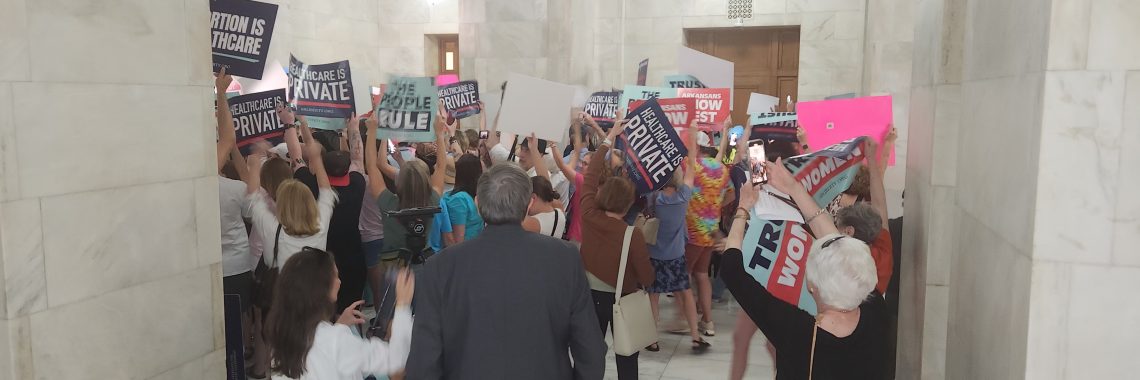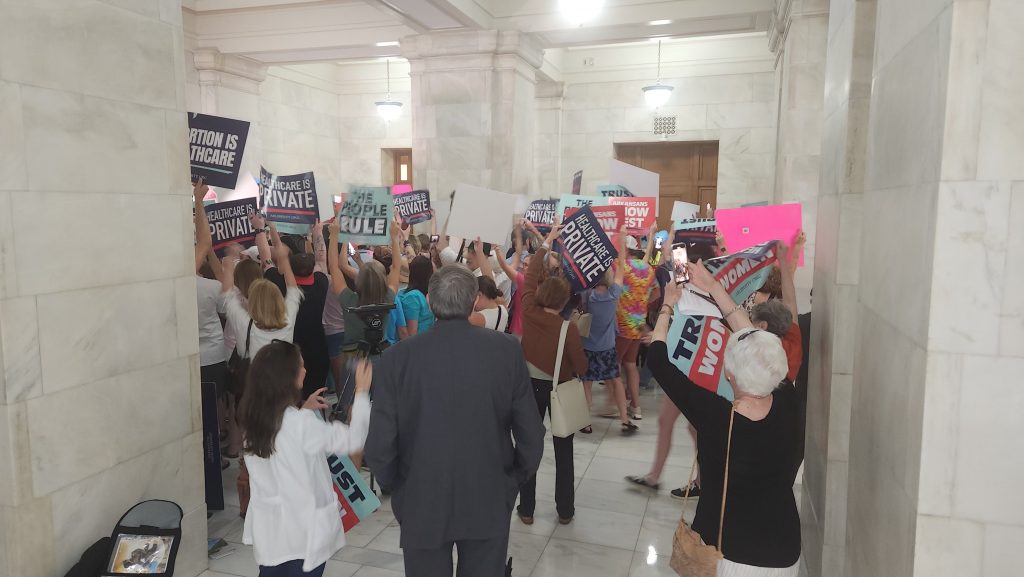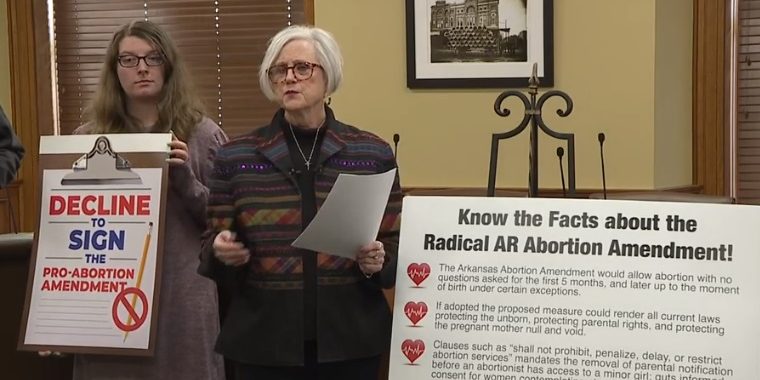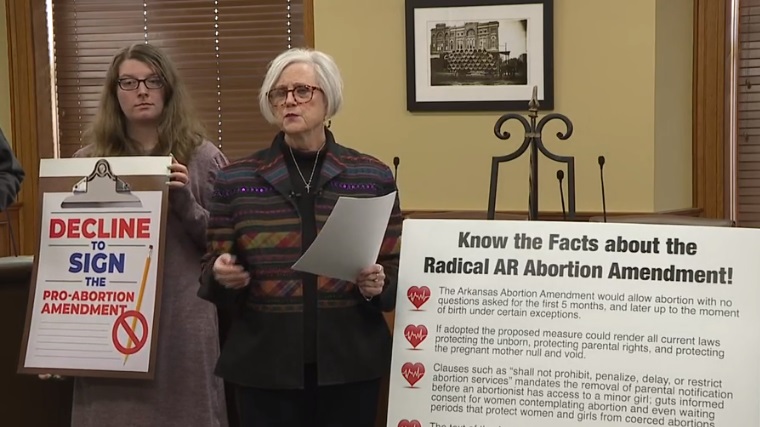Understanding the Arkansas Supreme Court’s Decision to Block the Abortion Amendment from the Ballot

On Thursday the Arkansas Supreme Court issued a decision effectively blocking the Arkansas Abortion Amendment of 2024 from the November ballot, because the measure’s sponsors failed to comply with state law.
Here is a brief overview of the case and the court’s decision.
Background on the Arkansas Abortion Amendment
Arkansans for Limited Government is the sponsor of the Arkansas Abortion Amendment. On January 23, the group received approval to begin circulating petitions to place the measure on the ballot.
By law, bringing an amendment up for a vote requires at least 90,704 valid signatures from registered voters.
As pro-lifers have noted again and again, the Arkansas Abortion Amendment would prevent the State of Arkansas from restricting abortion during the first five months of pregnancy — which is more extreme than Roe v. Wade and would allow thousands of elective abortions on healthy women and unborn children every year.
The measure would automatically nullify all state laws that conflict with the amendment — jeopardizing basic abortion regulations like parental-consent and informed-consent requirements and paving the way for taxpayer-funded abortion in Arkansas.
The amendment does not contain any medical licensing or health and safety standards for abortion, and it does not require abortions to be performed by a physician or in a licensed medical facility.
The measure also contains various exceptions that would permit abortion up to birth in many cases.
What Arkansas Law Says About Hiring Petition Canvassers to Gather Signatures
Arkansas law lets ballot initiative sponsors like Arkansans for Limited Government utilize volunteers to collect petition signatures or hire canvassers to gather signatures.
By law, if the ballot initiative’s sponsor pays petition canvassers to collect signatures, the canvassers must be Arkansas residents. They must undergo a background check, and they also must be given a copy of the state’s initiative and referenda handbook as well as an explanation of relevant state laws.
According to documents obtained via the Freedom of Information Act, Arkansans for Limited Government hired 265 canvassers to gather signatures for the abortion measure.
On July 5, Arkansans for Limited Government submitted petition signatures to place the Arkansas Abortion Amendment on the ballot.
By law, when the ballot initiative’s sponsor submits the petitions, the sponsor also must file a sworn statement confirming that each paid canvasser was employed in accordance with state law. Arkansans for Limited Government failed to file this affidavit when they submitted the petitions for the abortion amendment.
Because the sponsors failed to comply with this state law, Secretary of State John Thurston rejected all of the petitions for the abortion amendment.
That prompted Arkansans for Limited Government to file a lawsuit against Secretary of State Thurston.
What the Arkansas Supreme Court Decided
In a nutshell, the Arkansas Supreme Court decided on Thursday that Arkansans for Limited Government failed to comply with state law and that the Secretary of State was correct to disqualify all of the petition signatures gathered by paid canvassers.
However, the court’s decision indicated that the Secretary of State was wrong to reject the signatures collected by volunteers.
Arkansans for Limited Government’s volunteers collected only 87,675 petition signatures — well below the 90,704 necessary to make the ballot.
As a result, the decision effectively prevents the abortion measure from qualifying for the ballot.
A Deeper Analysis of the Decision
The Arkansas Justice Institute provided a deeper analysis of the decision, writing:
Jurisdiction: First of all, the Court unanimously rejected the Secretary’s argument that it did not have jurisdiction because the Secretary had not made a “sufficiency determination.” The Court unanimously held that the Secretary had made a “sufficiency determination of the facial validity of the initiative petition” when he decided the petition would not go forward due to failure to file the paid canvasser certification. This decision on jurisdiction allowed the Court to hear and then decide the case.
The Arkansas Code’s Requirements for Paid Canvassers: After determining that it had legal jurisdiction to evaluate the claims before it, the Court centered its focus on the Arkansas statutes that govern how a petition with paid canvassing signatures must be filed. Arkansas Code Annotated section 7-9-111(f) requires a signed certification that, before a paid canvasser began soliciting signatures: 1) the sponsor provided the Secretary of State’s initiatives and referenda handbook to each paid canvasser; and 2) explained the Arkansas law requirements for obtaining signatures on an initiative petition. Arkansas Code Annotated section 7-9-601(f) provides a “do not count” penalty if the required training and the handbook was not provided to paid canvassers.
The Court’s Decision on Paid Canvassers: The Arkansas Supreme Court found that the required certification was critically important because of the “clear legislative intent to protect the petition gathering process from fraud.” The Court noted that the paid canvasser training certification is the “only assurance the public receives” that the paid canvassers actually received the required information and training to comply with the law. While AFLG argued substantial compliance with the law due to its partial certifications, the Arkansas Supreme Court noted that it failed to submit a comprehensive paid canvasser training certification that covered every paid canvasser when it filed its petition — not at some point later after the Arkansas Constitution’s filing deadline. The Court said that the legislature’s language indicating mandatory compliance does not mean “just as long as you try.” The Court also noted that “at least seventy-four of the paid canvassers failed to ever have such certification filed.” The Court did not permit AFLG to take a piecemeal, partial, and post-deadline approach to compliance with the statute. There was “one actual required certification with the petition” according to Arkansas law. For this reason, the Court affirmed the Secretary of State’s decision not to count the signatures of the paid canvassers.
The Consequences for the Arkansas Abortion Amendment Petition:
While AFLG failed to comply with the Arkansas statutes on paid canvassers, the Court stopped short of agreeing with the Secretary that this meant the petition failed in its entirety. The Court noted that these particular statutes applied only to petition efforts that hired paid canvassers. As such, the Court considered the number of volunteer signatures obtained: 87,675. This number fell short of the 90,704 signatures required for an initial count. This meant that the Arkansas Abortion Amendment failed to qualify for an additional 30-day cure period to gather additional valid signatures. Because it failed to obtain the required number of signatures, the Arkansas Abortion Amendment failed to move forward and qualify for the ballot in November’s upcoming election.
Conclusion
The decision confirms that the sponsors of the Arkansas Abortion Amendment failed to comply with state law concerning paid petition canvassers.
As a result, the ruling effectively prevents the abortion amendment from appearing on the November ballot.





